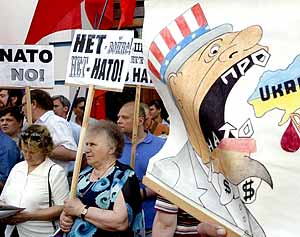12.07.2008
July 10, 2008 (the date of publication in Russian)
Alexander Sobko
SEA BREEZE OVERTURE
The head of Crimean Tatar Mejlis is happy to see anti-NATO demonstrators dispelled
 In our recent article focused on the problem of the Black Sea Fleet in Sevastopol, Crimea, we suggested that Ukraine's President Viktor Yushchenko is not just reluctant to solve the relevant political problems but deliberately fuels up confrontation between Kiev and Moscow. On the background of the new political crisis in Ukraine ensuing after the split of the liberal coalition and a new conflict between the President and Prime Minister Yulia Timoshenko, this political line seems utterly irrational. However, the events of early July confirm the impression that the President is committed to foster political, social and ethnic tensions in his country.
In our recent article focused on the problem of the Black Sea Fleet in Sevastopol, Crimea, we suggested that Ukraine's President Viktor Yushchenko is not just reluctant to solve the relevant political problems but deliberately fuels up confrontation between Kiev and Moscow. On the background of the new political crisis in Ukraine ensuing after the split of the liberal coalition and a new conflict between the President and Prime Minister Yulia Timoshenko, this political line seems utterly irrational. However, the events of early July confirm the impression that the President is committed to foster political, social and ethnic tensions in his country.
Recently, Yushchenko's closest associate Boris Tarasyuk, who used to pursue a staunch anti-Russian policy in his capacity of Minister of Foreign Affairs, claimed that the campaign for Ukraine's entry in NATO has proven inefficient. This fact was obvious already two years ago, when the organizers of Sea Breeze, the traditional US-Ukrainian Navy exercises, were forced to curtail the joint program because of massive protests of the population in Feodosia, Crimea.
Despite today's political disarray fraught with a collapse of state management, Mr. Yushchenko repeatedly agreed to conduct the joint exercises. In this year, Kiev tried to downplay the event. Still, the hush-hushed date of the start of U.S.-Ukrainian Sea Breeze 2008 naval exercise leaked out in mass media weeks before. This time, the organizers did not cancel the exercises. Instead, the "hypothetical aggressor" was attacked yet before the start: a tent camp of anti-NATO demonstrators, fixed near the site of the exercises in Odessa, was promptly crushed by local police. According to activists of the Ukrainian Progressive Socialist Party, the crackdown was more brutal than a year before. While dispelling the protesters, the policemen manhandled not only politicians but also pensioners and children.
It is noteworthy that the brutal action was publicly greeted by Mustafa Dzhemilev, the chair of Crimean Tatar Mejlis. The leader of the ethnic minority claimed that this kind of treatment of peaceful protesters was "quite appropriate".
In Crimea, protests against US-Ukrainian exercises coincided with the collision around state symbols. Last month, Kiev ruled to establish a memorial plaque in Sevastopol dedicated to the 90th anniversary of the Ukrainian Navy. In fact, the referred events of year 1918, when several ships of the Russian Navy raised Ukrainian flags, was a tactical maneuver of their command that tried to gain time to evacuate the ships from Sevastopol.
In their turn, Sevastopol's City Council decided to establish the monument of Catherine II, the Empress of Russia who once founded the city as a Russian military stronghold in the Black Sea. The competition between the symbols related respectively to the doom and glory of the Russian Empire, resulted in street clashes. Eventually, the plaque was removed while the statue of Catherine was opened despite the protest of the Sevastopol's mayor Sergey Kunitsyn, an appointee of Viktor Yushchenko. Days later, the city court ruled that the statue was established illegitimately.
Meanwhile, MP and leader of All-Ukrainian Freedom Association party Oleg Tyahnibok, addressing the regional assembly in Lvov, Western Ukraine, urged Viktor Yushchenko to introduce a state pf emergency in the whole Crimea. This task that is not so easy to be accomplished, regarding the disarray in the ranks of Ukrainian military that was displayed yet in May 2007, when the president tried to use military force to implement his decision of dismissing the national Parliament.
Not venturing to deploy regular troops to the streets of Sevastopol, the cornered leadership of Ukraine is still deliberately fueling up a massive conflict, involving ethnic confrontation between the Crimea's Russian majority and Crimean Tatars. This task requires rather covert operations than open battles.
Viktor Yushchenko's reputation of an obedient tool of US interests is no secret for anyone in Ukraine. Still, the invitation of US Ambassador William Taylor to the graduation ceremony at the Ukrainian Security Academy blows off the last fig leaf from the effigy of Ukraine's sovereignty. The euphoria of the Maidan "revolution" that elevated Viktor Yushchenko to power in 2005 has turned a disgrace of South Vietnam-type colonial dependence on the background of a political stalemate with an ensuing economic and social disaster.
Number of shows: 2176
rating:
2.93
 ENG
ENG 

 ENG
ENG 
